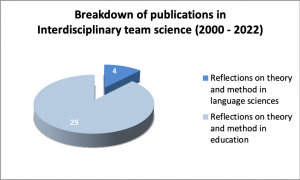Interdisciplinary team science

This theme developed out of two types of experiences. The first is the frustration I felt in multidisciplinary contexts where researchers from one discipline did not attempt to understand researchers from another. Or if they did attempt to understand one another, they arrived at an impasse that made further collaboration impossible. The second is the excitement I felt and the progress I saw being made when researchers were open to understanding each other and made efforts to find solutions to theoretical and methodological obstacles that seemed at first glance to hinder working together. Through these experiences, I learned that creativity and innovation often arise from unconventional paths and unexpected intersections.
The most recent work in this theme culminated in the edited book Language is a complex adaptive system: Explorations and evidence(1), published with Language Science Press. This work showcases new insights from the 5-year 4,4 M€ labex Advanced Studies on Language Complexity (ASLAN) that I lead.
Work here also includes scientometric analyses of research in education that give a view of its multi and interdisciplinary scope: Research in Education Draws Widely From the Social Sciences and Humanities(2). Other work establishes distinctions between knowledge elaboration and knowledge regulation in interdisciplinary contexts: Building and regulating cognitive, linguistic, and interactional aspects of knowledge between the individual and the group(3).
The Productive Multivocality project(4) describes collaboration between 30 epistemologically diverse researchers from 13 countries who used “pivotal moments” to compare analyses of group interaction, leading to new insights on learning and collaboration (see the presentation within NAPLeS (Network of Academic Programs in the Learning Science), under the auspices of the International Society of the Learning Sciences*. The paper A conceptual stance on CSCL history illustrates how a researcher’s analysis of mediation between a computational artifact and a user’s sense making depends upon a researcher’s epistemological stance(5).
Another long term project measured face-to-face interaction and collaboration in the context of two international interdisciplinary conferences in TEL with the objective of understanding how collaboration partners are chosen(6).
All of these projects focus on multi and inter-disciplinary research contexts and have the objective of describing the perimeter of these contexts as well as fostering collaboration amongst the researchers involved.
(1) Lund, K., Basso Fossali , P., Mazur, A., & Ollagnier-Beldame, M. (eds.). Language is a complex adaptive system: Explorations and evidence. (Conceptual Foundations of Language Science 8). Language Science Press. DOI: 10.5281/zenodo.6546419
(2) Lund, K., Jeong, H., Grauwin, S. & Jensen, P. (2020) Research in Education Draws Widely from the Social Sciences and Humanities. Front. Educ.5:544194. 10.3389/feduc.2020.544194
(3) Lund, K. (2019). Building and regulating cognitive, linguistic, and interactional aspects of knowledge between the individual and the group. Computers in Human Behavior, 100, 370-383. 1016/j.chb.2019.04.013
(4) Suthers, D. D., Lund, K., Rosé, C. P., Teplovs, C. & Law, N. (Eds.). (2013). Productive Multivocality in the Analysis of Group Interactions. In C. Hoadley & N. Miyake (Series Eds.), Computer Supported Collaborative Learning Series: Vol. 15. New York: Springer.
(5) Ludvigsen, S., Lund, K. & Oshima, (2021). A Conceptual Stance on CSCL History. In U. Cress, C. Rosé, A. Wise, & J. Oshima (Eds.). International Handbook of Computer-Supported Collaborative Learning,, (pp. 45-63). New York, NY: Springer International Publishing.
(6) Eberle, J., Stegmann, K. Barrat, A. Fischer, F. & Lund, K. (2021). Initiating scientific collaborations across career levels and disciplines – a network analysis on behavioral data. International Journal of Computer Supported Collaborative Learning. 16, 151-184. 10.1007/s11412-021-09345-7
*NAPLeS organizes webinars in the Learning Sciences on four main themes: how people learn, supporting learning, methodologies for the Learning Sciences and Computer-Supported Collaborative Learning.
